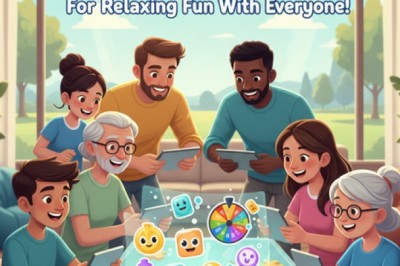views

Image via Pexels
Nurturing a Healthy, Lifelong Love of Learning in Your Child
Children aren’t born with a distaste for learning—it’s something that can fade if their curiosity isn’t supported. As a parent, you wield the power to help that spark not only stay lit but burn brightly into adulthood. The secret lies in transforming learning from a task into an adventure. When you create a world that celebrates questions and delights in discovery, you set your child up for a lifetime of growth and joy.
Curate a Home that Invites Exploration
Your home environment speaks volumes to your child about what matters. By filling it with books, puzzles, open-ended toys, musical instruments, and colorful art supplies, you create a living space that encourages questions and discovery. Keep a magnifying glass by the window to watch insects, a sketchpad on the table, or an old keyboard for tinkering. These small touches send a big message: wonder belongs here.
Lead by Going Back to School Yourself
One of the most powerful ways to model a love of learning is to return to it yourself. Whether you pursue a degree to advance your career or explore a field you’ve always been curious about, your commitment sends a strong message: learning never ends. Online degree programs make it more manageable to balance school with the chaos of work and family life. For instance, by earning a degree in psychology, you can study the cognitive and affective processes that drive human behavior so you can support those in need of help—check out options by exploring psychology degree options online. Your kids will see that education is a lifelong adventure, not a checklist to be completed in youth.
Make Books a Family Tradition
Reading isn’t just a skill—it’s a gateway to new worlds, ideas, and emotions. Start by reading to your child long before they can read back to you. As they grow, build reading into your routine with bedtime stories, library trips, or quiet reading hours where everyone grabs a book. Praise their choices, whether it’s comic books or encyclopedias, and keep rotating fresh titles so that reading never feels stale.
Introduce Them to the Full Menu of Interests
Kids can’t pursue what they’ve never seen. Introduce a wide variety of topics early on, not to force a path but to offer options they might not know exist. Watch documentaries on space, dig into myths from around the world, try a cooking project inspired by global cuisines, or explore local nature trails with a guidebook in hand. This buffet-style approach to learning helps your child identify what resonates and chase that feeling with gusto.
Make Learning a Game, Not a Grind
You don't need a classroom to teach something valuable. Hands-on activities, whether it’s a homemade science experiment or a scavenger hunt through the neighborhood, make learning stick because they activate the senses. Educational apps and games can also add variety—just be sure to vet them for quality and engagement. The goal is to make learning feel like play, not pressure.
Celebrate the Little Wins
Progress doesn’t always come with fanfare, but it deserves to be noticed. When your child writes their first story, solves a tricky puzzle, or finally understands a math concept they struggled with, celebrate it—verbally, with a note on the fridge, or even with a small dance party. These gestures create emotional markers that associate learning with joy and pride. That positivity builds confidence, and confidence fuels continued exploration.
Keep Conversations Open and Curious
Ask questions that don’t have a “right” answer. Encourage your child to imagine, to predict, to wonder aloud. Discuss ideas, current events, or “what if” scenarios during dinner. This makes intellectual engagement part of everyday life, and it teaches your child that their thoughts have value. When their ideas are heard and explored, they’re more likely to stay curious and connected.
In the end, the goal isn’t to have a child who gets perfect grades—it’s to raise someone who never stops learning. When you cultivate curiosity, support their interests, and make learning feel like something they get to do instead of having to do, you give them a gift that lasts beyond school. Keep showing them that discovery is its own reward. A lifelong learner isn't born—they’re nurtured into being, one curious moment at a time.
Discover a world of insightful articles and resources by visiting WONGCW today, and stay ahead with the latest trends and innovations!























Comments
0 comment